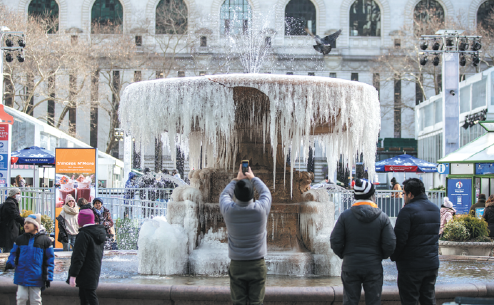Arctic blast breaks US wind chill record

NEW YORK — In an Arctic blast that brought so-called frostquakes to parts of the United States, the country recorded its lowest-ever wind chill temperature, meteorologists said on Saturday.
Atop Mount Washington in northeastern New Hampshire state, the wind chill factor reached — 78 C overnight, the National Weather Service, or NWS, said.
The service's office in the Maine town of Gray said in a tweet that it set a new US record for the lowest wind chill temperature in the US.
CNN reported that it broke the previous record of-76 C set in Alaska.
The previous low at Mount Washington was — 74 C, recorded there in 2004, The Weather Channel said.
At about 1,920 meters, Mount Washington is the highest peak in the northeastern US and is known for having some of the world's worst weather.
Temperatures of — 43 C and wind gusts of over 177 kilometers an hour combined for the historic low.
The NWS office in Caribou, Maine, said a wind chill of — 51 C was recorded in the small town of Frenchville, just south of the border with Canada.
The office said it had received reports of frostquakes, also called cryoseisms in the region.
"Just like earthquakes, (they) generate tremors, thundering sensations. These are caused by sudden cracks in frozen soil or underground water when it's very cold," the NWS office wrote on Twitter.
Before the blast, it had warned of an "epic, generational Arctic outbreak".
The NWS said the chills would be "something northern and eastern Maine has not seen since similar outbreaks in 1982 and 1988".
"Most stations are forecast to see their lowest wind chills in decades, or in some cases, the lowest-ever recorded," the service said.
Frostbite warning
It warned that frostbite of exposed skin can occur within five minutes in such conditions.
"The dangers of being caught unprepared without shelter from the elements and without proper winter survival gear cannot be stressed enough," the service wrote.
The NWS said the blast brought temperatures 12 to 1 C below average over parts of the northeast and the coastal Mid-Atlantic.
Many ski areas limited operations due to the temperatures. Jay Peak, a ski mountain in northern Vermont near the Canadian border, closed down on Friday and Saturday, citing the danger to staff members and skiers.
Extreme weather warnings covering several million people were in effect across much of New England, Quebec and eastern Canada.
A wind chill factor of — 41 C was measured at Montreal International Airport.
The Hydro-Quebec energy company said the polar blast had sparked record-high electricity consumption late on Friday and urged customers to turn down their heating by a degree or two.
In New York, a "code blue" regulation was in effect, meaning no homeless shelter could turn anyone away.
In the city's Central Park, the mercury dipped to — 16 C, the NWS said.
Wind chill temperatures fell below — 34 C in Boston, where public schools were closed on Friday as a precautionary measure.
Boston's Pine Street Inn, the largest provider of homeless services in New England, ramped up outreach to those on the streets, doubling the number of vehicles that could transport people to shelters and opening their lobby to provide extra space.
The emergency room at Massachusetts General Hospital treated several people for hypothermia overnight and a couple was admitted for frostbite.
"The reason that people unfortunately end up with severe frostbite in most cases is just because they don't have anywhere warm and safe to go," said Ali Raja, deputy chair of the emergency department.
Agencies Via Xinhua

Today's Top News
- China commemorates 80th anniversary of Taiwan's restoration
- China, US start economic, trade talks in Kuala Lumpur
- Support the UN for the 21st century
- Adapting to local realities fuels new quality productive forces
- World watches as China and US hold new trade talks
- Premier's tour set to deepen E. Asian ties






























